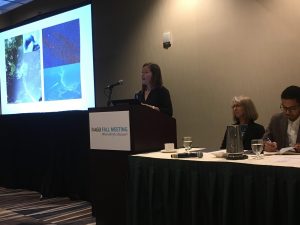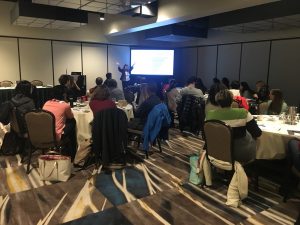March 26, 2018
Building a Resilient Scientific Community: A Recap of the 2017 AGU Student & Early Career Scientist Conference
Posted by AGU Career Center
The Student and Early Career Scientist Conference at the 2017 American Geophysical Union Fall Meeting in New Orleans, on 10 2017, brought together 150 young scientists and professionals from 22 AGU sections. Attendees shared stories and exchanged ideas surrounding the conference theme, “Becoming a Resilient Scientific Community” through plenaries, breakout sessions, and a gallery walk. Presentations at the conference addressed how to effectively conduct research across various spatial and temporal scales to bolster resiliency of both human communities and the environment. There were also professional development opportunities geared to enhance skills and tools to become more resilient scientists. A complete agenda can be found on the event page.

Laura Bracken, outreach manager for CARTHE, describes citizen science approaches to tracking ocean currents
In the morning, panelists described examples of resiliency efforts led by ecologists, sociologists, city planners, and engineers to maintain ecological functioning and support human activities around the world. For example, Laura Bracken, the outreach manager from CARTHE described how citizen science and local knowledge were used to track ocean currents and bolster oil spill response. Additionally, New Orleans Deputy Mayor and Chief Resilience Officer Jeffrey Hebert explored how community planning and expertise in wetlands restoration were used to enhance resilience in vulnerable low-lying sections of Louisiana. Dr. Nancy Huntly also described instances of social and ecological resilience through a series of international case studies. Following the panel, students learned about the history of the American Geophysical Union, and the geosciences more broadly, through Dr. Kristine Harper’s dynamic keynote presentation containing pictures and anecdotes of scientists past. This presentation provided information on how scientists have remained resilient in the face of shifting funding and employment opportunities.

Shelley Stall, director of AGU Data Data Programs, discusses data management plans with conference attendees.
The afternoon consisted of three different skill-building breakout sessions. During the session on data practices led by Shelley Stall, Director of Data Programs at the American Geophysical Union, young scientists learned best practices for storing, sharing, and analyzing data via development of a data management plan. Students and early career researchers engaged in spirited discussions regarding the types of data that are most useful for their own research, critical types of metadata, and how to assess validity of data collected by others. The session on scientific communication introduced scientists to Tegan Wendland, Interim News Director at New Orleans Public Radio, who helped the scientists craft meaningful and approachable stories that described various qualities of their research. The last session led by Valerie Sloan, Senior Higher Education Specialist at National Center for Atmospheric Research, and Christine Wiedenmyer, CIRES Associate Director for Science at the University of Colorado, workshopped how to build an effective support network. As part of this exercise, students and young professionals thought about what roles various mentors played in their lives, if there were any gaps in their network, and how they could strengthen their support networks at different stages in their career.
During coffee breaks and lunch, a “Gallery Walk” activity prompted attendees to consider a series of thought-provoking questions to expose shared experiences of early career scientists. Easel pads were provided around the room to allow attendees to post their thoughts and engage in a dialog with other attendees. The responses from the Gallery Walk revealed that concerns about accepting rejection, getting proposals funded, dealing with short contracts and having to relocate for jobs, and deciding whether or not to stay in the academic realm were common challenges. However, attendees also described skills they developed to remain resilient in their careers, which included improving writing and critical thinking skills, practicing different styles of communication to make science accessible, asking simple yet effective questions, and keeping an open mind. Participants also shared insights into how to effectively harness citizen science efforts to supplement formal inquiry to build resilient communities, including crowdsourcing data-gathering efforts, making data visible to participants, and incorporating local knowledge into the scientific framework. See the complete gallery walk answers here.
The planning committee would like to thank our sponsor, PLOS One, for their support and the AGU staff for all of their assistance.
Planning is currently underway for next year’s Student and Early Career Scientist Conference, which will be held in advance of the 2018 AGU Fall Meeting in Washington, D.C. This conference will involve bridging the gap between science and action; stay tuned for future updates! If you are interested in being a part of the planning committee, contact [email protected].


 On the Job is an AGU blog, that provides career advice and workforce guidance to geoscience students, early-career and established professionals who are interested in pursuing professional enrichment.
On the Job is an AGU blog, that provides career advice and workforce guidance to geoscience students, early-career and established professionals who are interested in pursuing professional enrichment.